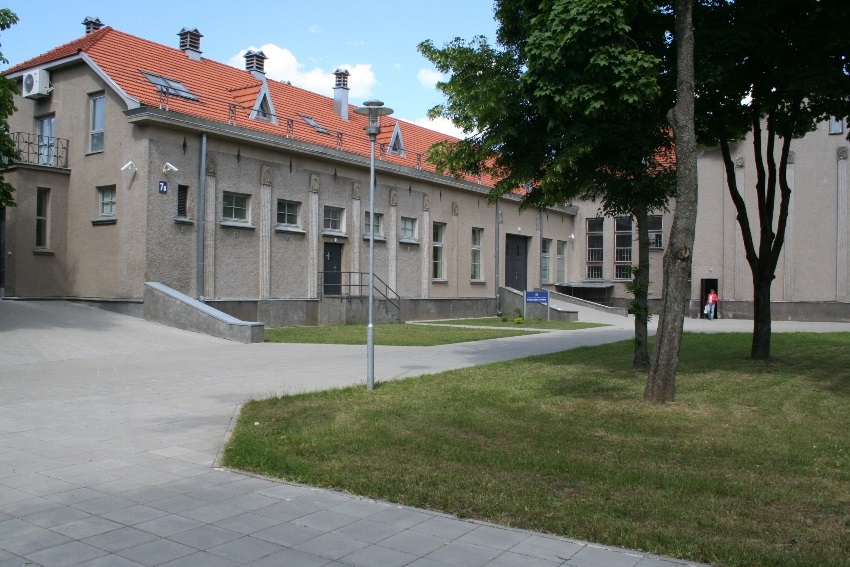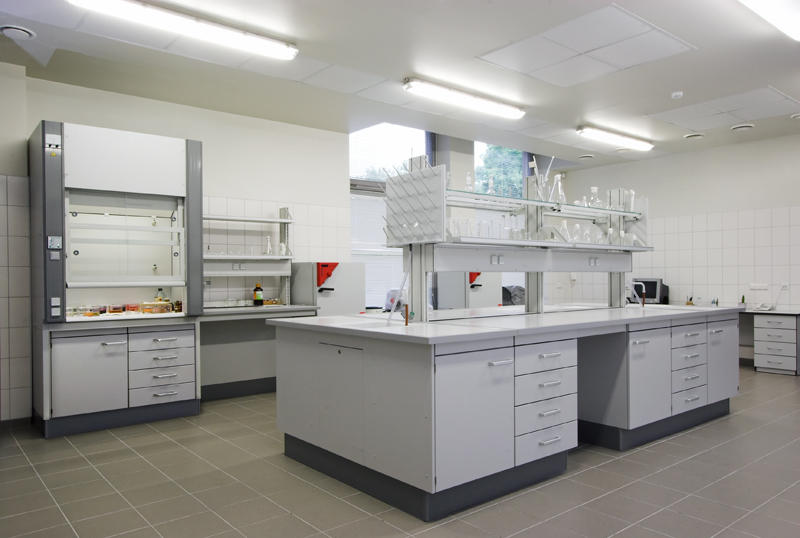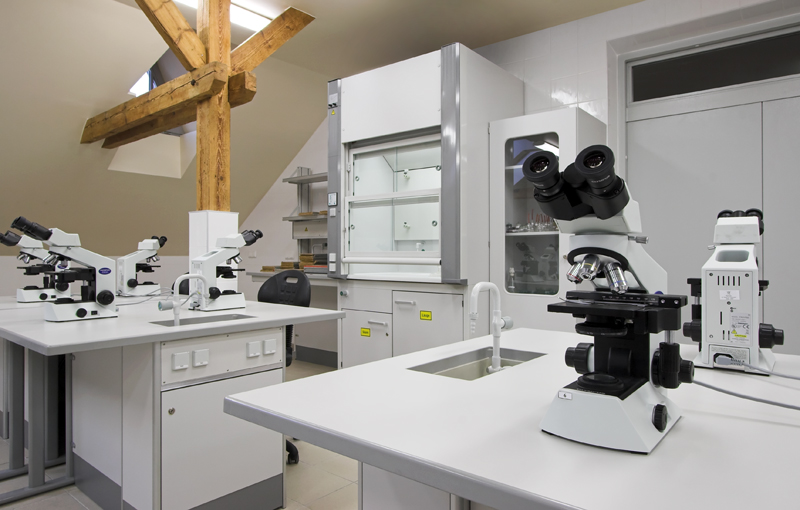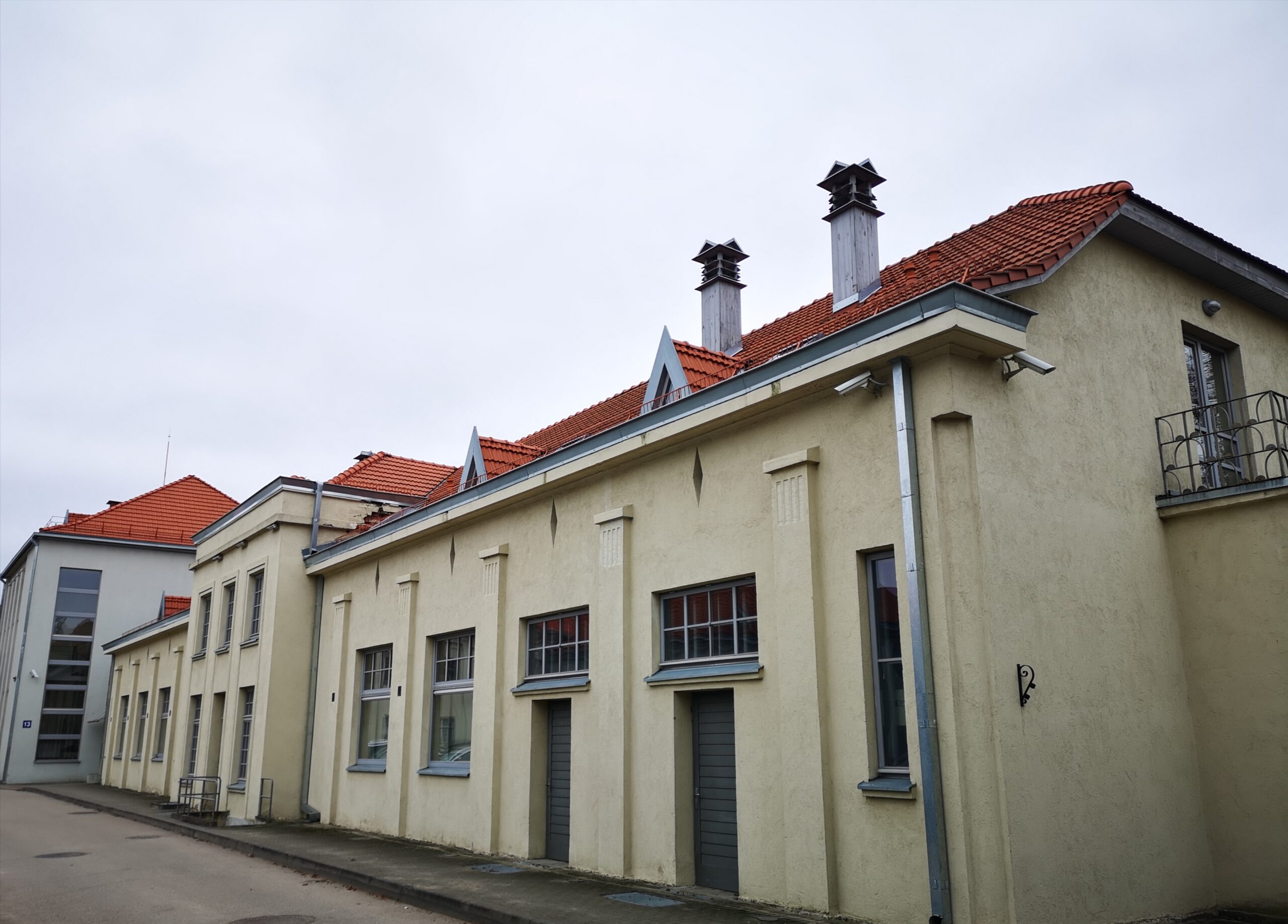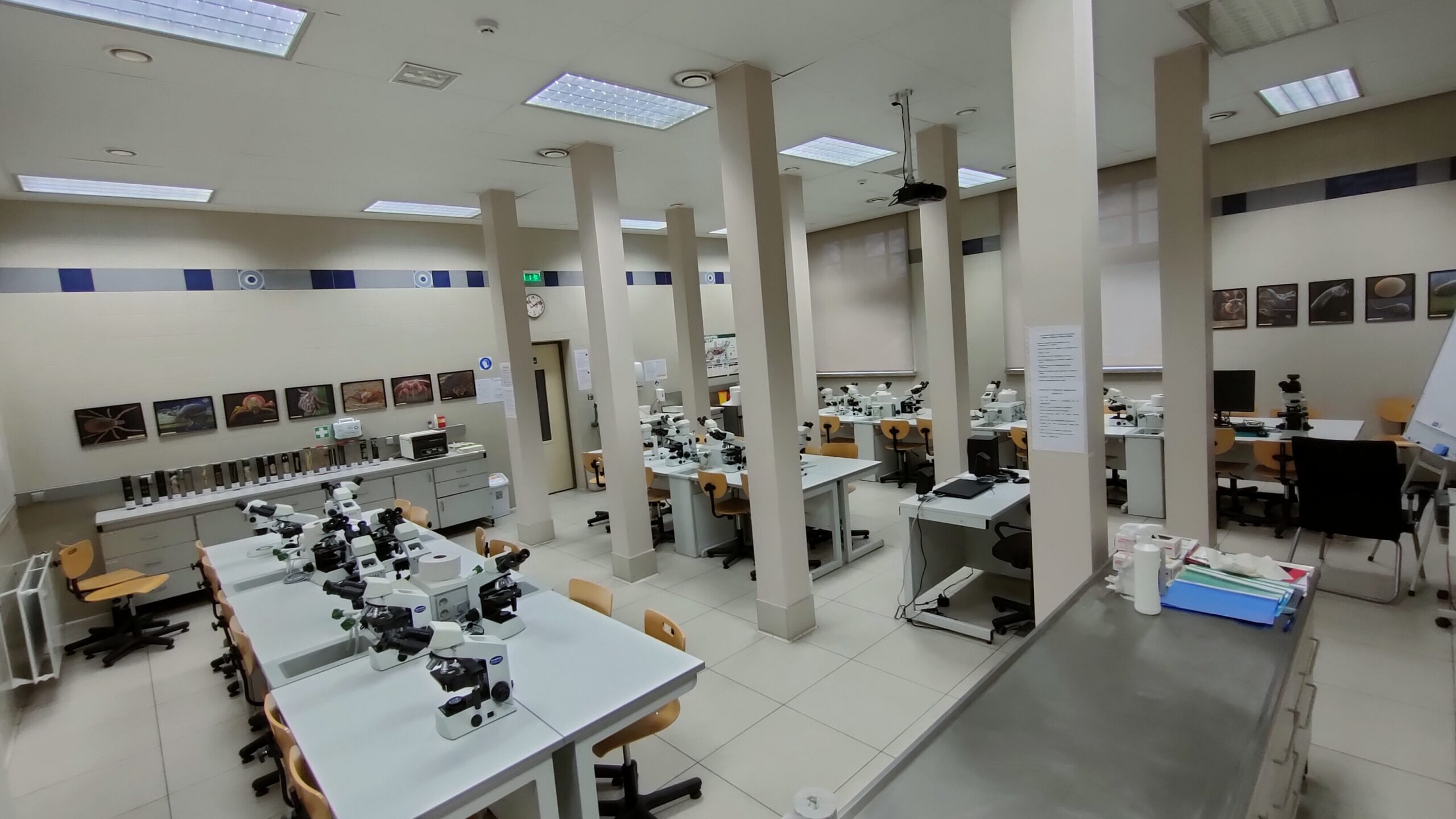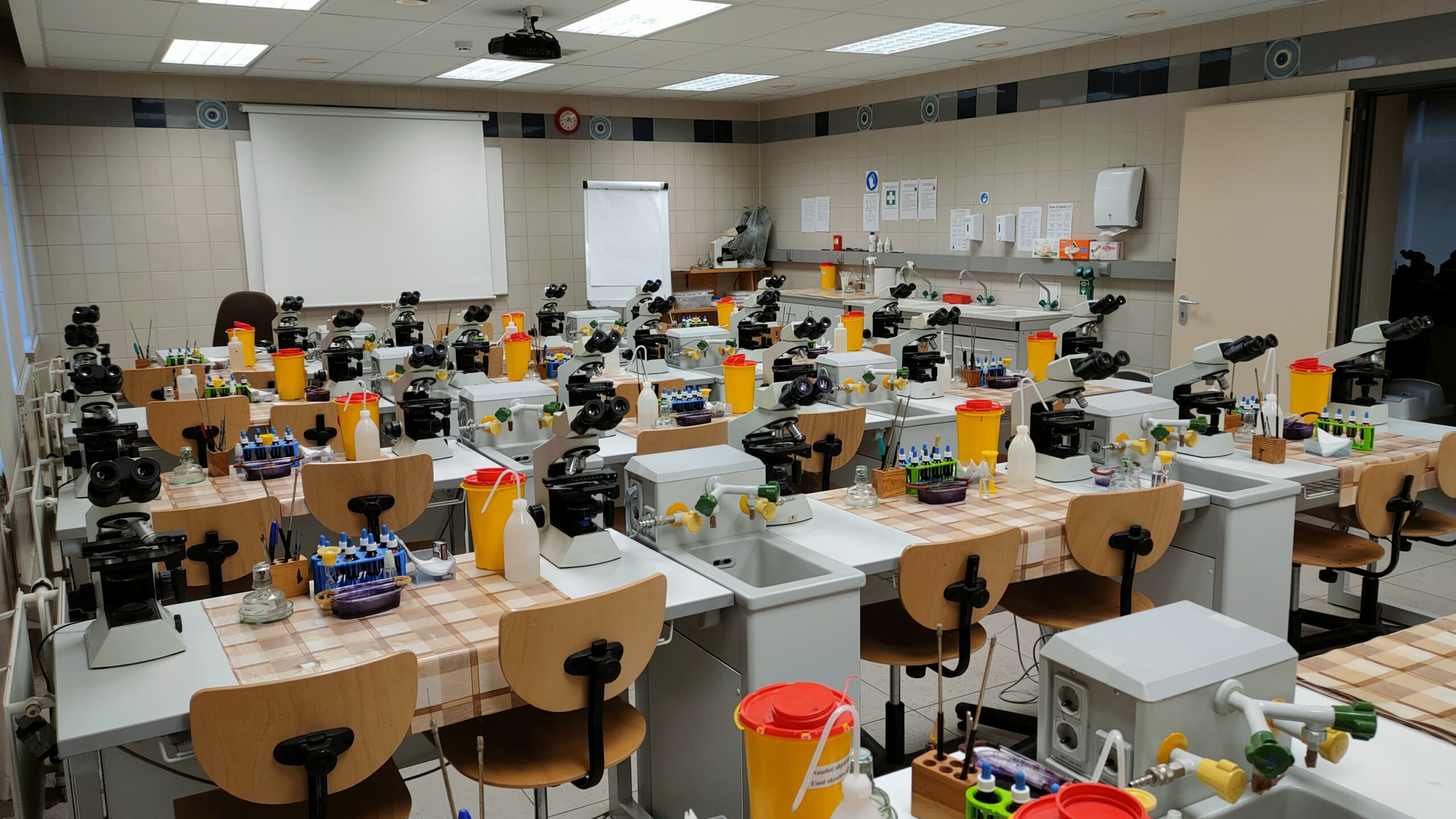OUR ACTIVITIES
The Department teaches the Master’s degree students, doctoral students and residents in Veterinary Medicine, and delivers professional development training to veterinarians. The Department of Veterinary Pathobiology delivers training in the following study areas: morphology, epidemiology, pathogenesis, diagnosis, prophylaxis and control of infectious and invasive diseases in animals in biomedical sciences, veterinary medicine, food safety and animal science; pathomorphological diagnosis of animal diseases; pathophysiology and pathomorphology of animal reproduction; veterinary medicine legislation and drafting of regulatory documents. Activities in these areas include the publication of research and science popularisation articles, preparation and implementation of international and national research projects, development of course books, study/training books, scientific monographs, teaching aids, research reports and presentations.
The Department of Veterinary Pathobiology, its functional units (the Pathology Centre, the Laboratories of Parasitology and Histopathology) and auxiliary facilities have been reconstructed and upgraded, and the units have been equipped with state-of-the-art equipment for research and studies.
The Department performs detection of infectious and invasive pathogens in animals and birds, contamination of pastures with parasite larvae; provides advice on the diagnosis, treatment, prophylaxis, and anthelmintic resistance of infectious animal diseases and zoonoses; investigates the parasite-host relationship and the effect of nutrients on the invasion of the gastrointestinal tract; and uses serological and molecular methods to diagnose bacterial, parasitic, and viral animal diseases.
The Pathology Centre of the Department carries out pathological morphological examinations of animal carcasses, provides advice to veterinary specialists and animal breeders, and carries out forensic veterinary examinations.
The Department reviews publications on veterinary pathobiology, carries out expert examination of veterinary medicinal products registered and re-registered in the country, performs the diagnostics of bacterial, chlamydial, parasitic and viral diseases, drafts various regulatory documents, and advises professionals and farmers on veterinary pathobiology control. The Department is a branch of the Republican Microbial and Cell Culture Bank.
The Department cooperates, prepares projects and concludes agreements with foreign and national research and educational institutions, competent authorities and other economic operators carrying out state-funded and outsourced research works, and participates in their implementation. The Department facilitates and assists students, graduate students, residents and doctoral students in carrying out scientific research work.
National projects
- Studies on the use of plant extracts and fractions for the inhibition and control of environmental viruses in animals. Project by research groups (the Research Council of Lithuania) (MIP (FITOKONTROLĖ), 2015–2018. Coordinator: Vytautas Magnus University. Coordinator at LSMU: Prof. Dr. A. Šalomskas.
- The effect of alogeneic osteochondral transplantation on the regeneration of articular cartilage in the experimental animal articular cartilage damage model (CHONDRO), 2013–2015. Project participant: Assoc. Prof. Dr. A. Pockevičius.
- Project “Compositions Based on Nanostarch and Natural Bioactive Materials (NANOKRAKMOLAS)” under the national research programme “Healthy and Safe Food”, Ministry of Agriculture, 2011–2015. Project coordinator: Kaunas University of Technology. Project participant: Prof. Dr. J. Šiugždaitė.
- Creation of Biological Cardiostimulator Involving Foreign Science and Study Institutions and Improving Competencies of Researchers and Other Employees (BIOKARDIOSTIM), 2013–2015. No. VP1-3.1-ŠMM-10-V-02-029 (implemented together with LSMU and state research institute “Innovative Medicine Center”). Project participant: assist. D. Juodžentė.
- “Innovative advanced therapy construct for cartilage regeneration (ICAR)” (No. 01.2.2-LMT-K-718-01-0078 / DOTSUT-225 / PRM17-196). 2018–2021. Project implementer: Alius Pockevičius.
- “Development of advanced cellular therapy prototypes for prevention and treatment of acute and chronic cartilage lesions (RECART)” (No. 01.2.2-CPVA-K-703-02-0011). 2018–2021. Project implementer: Alius Pockevičius.
- Assessment of applied technological properties of collagen for the purpose of virus and bacteria immobilisation processes, modelling and performance assessment in different virus and bacteria model systems. Agreement No. 2020-PR-00135; 2021. Project implementer: Algirdas Šalomskas.
- Project “Anti-viral filter with metal and metal oxide nanostructures (AntiVirus-21)”, No. 01.2.2-LMT-K-718-05-0032). Funded by the Research Council of Lithuania and the European Regional Development Fund. Implemented by KTU, LSMU, and WOP, 2021–2023. Head of the LSMU part: Algirdas Šalomskas.
- R&D project “Anthelmintic resistance and control of sheep gastrointestinal parasites in Lithuania”. (No. MT-18-06/ŽŪM). 06/2018–11/2020. Head of the project: Saulius Petkevičius.
- “Application of Emamectin benzoate (EMA) to the treatment of carp louse (Argulus foliaceus)”, research project No. MT-19-14.PRM19-131 commissioned by the Ministry of Agriculture of the Republic of Lithuania. 2019– 2020. Project implementer: A. Pockevičius.
- Agriculture, food, fisheries and rural development research and experimental development program 2015-2020; MTTV-19-5 “Studies in the performance of synchronisation of oestrus and ovulation in beef cows of various breeds” (implementation period: 2019–2020). Project implementer: V. Riškevičienė.
International projects
- Anti-microbial coating innovations to prevent infectious diseases (AMCI). COST activity No. CA15114. 2015–2019. Project participant. Representative of the activity management committee: Prof. Dr. J. Šiugždaitė.
- Tackling the parasitological challenges arising from organic farming practices (ProPara). BP7, ERA-NET, 2015–2018. Coordinator: Prof. Habil. Dr. S. Petkevičius.
- New and emerging challenges and opportunities in wastewater reuse (NEREUS). COST activity No. ES1403, 2014–2018. Coordinator: Prof. Dr. J. Šiugždaitė.
- European Network for Neglected Vectors and Vector-Borne Infections (EurNegVec). COST activity No. TD1303, 2013–2017. Coordinator: Vytautas Magnus University. Project participant: Prof. Habil. Dr. S. Petkevičius.
- TEMPUS projekto Modernisation if higher education in the area of food quality and safety in Tajikistan No. 544529-TEMPUS-1-2013-1-LV-TEMPUS-JPCR dalyvis. TEMPUS, 2013–2016. Project participant: Assoc. Prof. Dr. A. Malakauskas.
- The significance of rodent communities for the transmission and distribution of Echinococcus multilocularis: Ecological and experimental investigations for risk assessment BP7, EMIDA (Emiro), 2012–2015. Coordinator: Assoc. Prof. Dr. M. Šarkūnas.
- The efficacy of three different dosing regiments of Milbemax (milbemycin oxime, praziquantel) against gastrointestinal helminth infections in dogs (study number GTS-12-021) (“Novartis Project”) and “The eficacy of three different dosing regiments of Drontal Plus or Profender against gastrointestinal helminth infection in dogs” (“Bayer project”). 2013–2014. Coordinator: Assoc. Prof. Dr. M. Šarkūnas.
- Goat-parasite interactions: from knowledge to control. COST activity No. FA0805, 2008–2014. Coordinator: Prof. Habil. Dr. S. Petkevičius.
- “Development and assessment of the rapid diagnostic test for caprine infectious arthritis-encephalitis (CAE)”. Project No. TM-21-1/2021-PRO-00041. The project was conducted under initiative “International Coordination of Research on Infectious Animal Diseases (ICRAD)” European Union’s Horizon 2020 research and innovation funding programme under the grant agreement No. 862605. Project coordinator in Lithuania: Saulius Petkevičius. Participants in Lithuania: Algirdas Šalomskas, Tomas Kupčinskas, Alvydas Malakauskas.
- Project “Application of interdisciplinary method for successful animal disease control”. Head of the project: Prof. Alvydas Malakauskas. The project was implemented within the framework of collaboration between the African Swine Fever Centre under the Department of Veterinary Pathobiology of the Veterinary Academy and the Friedrich-Loeffler-Institut (FLI) (Germany). Implementation period: 2020.
Collaboration in Lithuania: the Department collaborates with economic operators to ensure the development of practical skills of the students of the Veterinary Medicine study programme in the fields of veterinary pathology, infectious diseases, veterinary parasitology dealt with at the Department of Veterinary Pathobiology. Agreements of collaboration have been concluded with the following economic operators: UAB Zujų paukštynas; AB Vilkijos ūkis; ŽŪB Lytagra; L. Drasdauskienė’s organic sheep farm; UAB Jovaigė; UAB Rietavo veterinarinė sanitarija. There is an ongoing collaboration with AB Kauno grūdai, AB Kaišiadorių paukštynas, AB Vilniaus paukštynas, UAB Idavang, AB Vilkijos ūkis, Lithuanian Sea Museum, Small Animal Clinic, National Food and Veterinary Risk Assessment Institute (NMVRVI).
Foreign collaboration: ongoing collaboration with the University of Copenhagen (Denmark), Institute of Parasitology, Zurich University (Switzerland), Institute of Parasitology, Slovak Academy of Sciences (Slovakia), Swedish University of Agricultural Sciences (Sweden), Edinburgh University, Moredun Research Institute (Scotland), Toulouse University (France), Azabu University (Japan).


